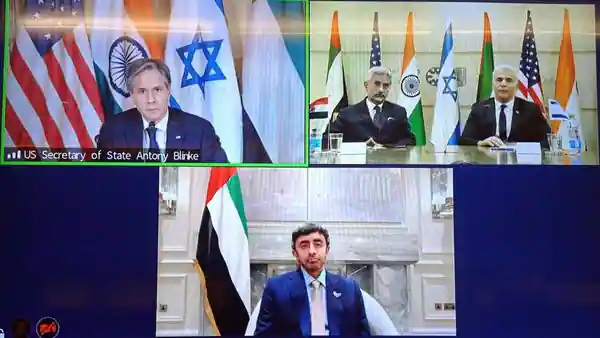
‘New Quad’ lists areas of co-operation

Foreign ministers of India, Israel, the UAE, and the US discussed enhancing cooperation in maritime security and global public health, besides joint infrastructure projects in transportation and technology
NEW DELHI : Increasing trade, enhancing cooperation in maritime security and global public health, besides joint infrastructure projects in transportation and technology, were among the subjects identified for cooperation at the first meeting of the foreign ministers of India, Israel, the UAE and the US, US and Israeli statements said.
The meeting led by , Union Minister of External Affairs Dr S. Jaishankar with Israel Foreign Minister Yair Lapid calls on the quadrilateral meeting with United Arab Emirates Foreign Minister Sheikh Abdullah bin Zayed Al Nahyan and US Secretary of State Anthony Blinken via video call, which is being looked at as a possible “new Quad”, took place virtually and “decided to establish an international forum for economic cooperation” with the four ministers convening for an in person meeting in Dubai soon—possibly next month, an Israeli readout of the talks said.
While Indian foreign minister S. Jaishankar and Israeli foreign minister Yair Lapid joined the talks from Israel where the Indian minister has been on a visit since Sunday, the UAE foreign minister Abdullah Bin Zayed Al Nahyan and US secretary of state Antony Blinken joined from their respective capitals.
“During the meeting, the four ministers held a discussion on possibilities for joint infrastructure projects in the fields of transportation, technology, maritime security, and economics and trade, as well as for additional joint projects,” the Israeli statement said.
Israeli foreign minister Lapid, who broached the idea of such a “quadrilateral” meeting during a recent visit to Washington, said that the four countries had a “unique set of capabilities, knowledge, and experience that can be used to create the network that we all want to see created”.
“I think the word we’re looking for here is synergy, because this is what we’re going to try and create starting with this meeting. Synergy that will help us work together on infrastructure, digital infrastructure, transport, maritime security and other things that preoccupy us all,” Lapid said according to the Israeli statement.
US State Department Spokesman Ned Price said in a statement that the four countries “discussed expanding economic and political cooperation in the Middle East and Asia, including through trade, combating climate change, energy cooperation, and increasing maritime security”.
Support for public health at the time of the covid-19 pandemic was also a topic of discussion.
Blinken “reiterated the Biden Administration’s support for the Abraham Accords and normalization agreements and discussed future opportunities for collaboration in the region and globally”, Price said referring to the August 2020 pact between the US, UAE, and Israel under which the latter two normalized ties after being at odds with each other for decades.
“Discussed working together more closely on economic growth and global issues. Agreed on expeditious follow-up,” Jaishankar said in a Twitter post after the talks. There was no statement from the Indian foreign ministry on the talks.
Blinken in his Twitter post said that the meeting had focused on “shared issues of concern in the region and globally, and the importance of expanding our economic and political collaboration”.
Each country will appoint senior professionals to a joint working group that will formulate options for cooperation, the Israeli statement added.
The new “Quad” meeting comes on the back of the momentum created by the Abraham Accords. And it follows a meeting in Washington between Blinken, Lapid and Sheikh Abdullah that reviewed the progress of normalization of Arab-Israeli ties.
India, Israel and the UAE have already established trilateral cooperation—in trade and investment—since the Abraham Accords. In May, India, Israel and the UAE had clinched their first trilateral partnership under which an Israeli company was to produce robotic solar cleaning technology in India for a project in the UAE.
India supported the Abraham Accords with the Indian foreign ministry saying that New Delhi “has always supported peace and stability in West Asia which is our extended neighbourhood. As such we welcome these agreements for normalization of relations between Israel and UAE and Bahrain.”
The new “Quad” gives India the flexibility to engage more freely with Israel and India’s partners in the Gulf region. Israel is a key security partner with defence trade between the two countries seen as valued at about $1 billion annually. Some of the Gulf countries with whom India has developed close are seen as key interlocutors on Afghanistan, Qatar being a case in point. The UAE has been an interlocutor for India when it comes to Pakistan.
New Delhi so far has been able to balance ties with Iran and its other partners like Israel and the UAE. Jaishankar was the first to call on Ebrahim Raisi as president elect and also attended his inauguration in August. Cooperation with Iran is a key element of its strategy for Afghanistan given that Tehran has ties with the Taliban and is also crucial for the implementation of the Chabahar port.

